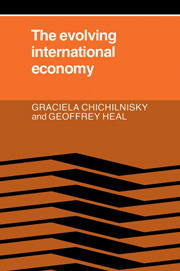Preface
Published online by Cambridge University Press: 03 May 2010
Summary
The first version of this book was produced in partial fulfillment of a contract between the United Nations Conference on Trade and Development (UNCTAD) and the United Nations Institute of Training and Research (UNITAR), under which the latter undertook to assist the Secretary General of UNCTAD in the preparation of material relevant to UNCTAD VI, the sixth major international conference of the UN system on trade and development. It draws on results of economic studies, both theoretical and empirical, conducted by the authors over a number of years. Chichilnisky's studies originated in the production of the Bariloche model at Fundacion Bariloche, Argentina, 1972–6, and were subsequently conducted under the auspices of the UNITAR Project on the Future at Harvard University, Columbia University, and the University of Essex with support from the U.S. National Science Foundation, the Rockefeller Foundation, the Institute for Mathematics and Its Applications at the University of Minnesota, and the Center for the Social Sciences, Columbia University. Their conclusions are embodied in Part II of this book. Heal's research was begun at the University of Sussex, and subsequently continued at the University of Essex, at Yale University, and at the Columbia Business School with support from UNITAR, the National Science Foundation, the U.K. Economic and Social Research Council, the Institute for Mathematics and Its Applications at the University of Minnesota, the Center for Social Sciences, Columbia University, and the Faculty Research Fund of the Columbia Business School. His research was concerned mainly with the issues in Part I of the book.
- Type
- Chapter
- Information
- The Evolving International Economy , pp. vii - viiiPublisher: Cambridge University PressPrint publication year: 1987



